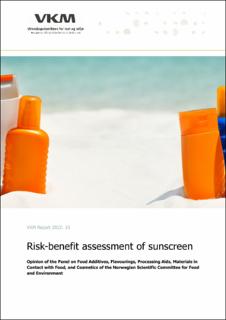Risk-benefit assessment of sunscreen - Opinion of the Panel on Food Additives, Flavourings, Processing Aids, Materials in Contact with Food, and Cosmetics of the Norwegian Scientific Committee for Food and Environment
Bruzell, Ellen Merete; Carlsen, Monica Hauger; Caspersen, Ida Henriette; Denison, Eva Marie-Louise; Devold, Tove Gulbrandsen; Granum, Berit Brunstad; Mathisen, Gro Haarklou; Rundén-Pran, Elise; Rasinger, Josef; Rohloff, Jens; Svendsen, Camilla; Husøy, Trine
Peer reviewed, Journal article
Published version
Permanent lenke
https://hdl.handle.net/11250/3011592Utgivelsesdato
2022Metadata
Vis full innførselSamlinger
- Miscellaneous publications [252]
- Publikasjoner fra CRIStin [3070]
Originalversjon
VKM Report. 2022, 2022:10 (10), 1-473.Sammendrag
VKM has performed a risk-benefit assessment of sunscreen use and six UV filters. This task was undertaken on the initiative of a VKM Panel in response to the apparent paradox between the need for protective measures, such as use of sunscreens, to reduce Norway’s high incidence and mortality of skin cancer and a consumer concern for the safety of sunscreens. Concerns include safety of ingredients and sunscreens’ effect on vitamin D synthesis. Sunscreen products are legally regulated as cosmetic products in the EU, and only approved UV filters up to a maximum determined concentration are allowed in the ready-foruse preparation. VKM used a systematic approach to assess risks and benefits of sunscreen use and risks of six selected UV filters: bis-ethyl-hexyloxyphenol methoxyphenyl triazine (BEMT), butyl methoxydibenzoyl methane (BMDBM), 2-ethylhexyl salicylate (EHS), ethylhexyl triazone (EHT), octocrylene (OC), and titanium dioxide in nanoform (NP-TiO2). These UV filters are among the most frequently used in sunscreens on the Norwegian market. Sunscreen sprays and lip products were not included. Scientific publications and reports up to 2020 were retrieved to assess adverse and protective effects of sunscreen and adverse effects of UV filters. We assessed risk of bias in the studies and evidence for health outcomes with the aid of validity tools, and estimated exposure to each UV filter using probabilistic methods. The evidence showed that sunscreens were beneficial in protecting against certain skin cancers. Insufficient evidence precluded determination of the hazard associated with sunscreen use. The UV filters occurred in concentrations similar to or below the limits set in the EU cosmetics regulative. VKM considered that little to no hazard was associated with use of the six evaluated UV filters. VKM concludes that the risks related to use of the six evaluated UV filters are negligible since the real-life use of these UV filters is several-fold lower than the amounts that may cause any adverse health effect. The evidence for harmful health effects of sunscreens is insufficient to determine risk. Sunscreen use protects against certain skin cancers and is beneficial for the general Norwegian population. Risk-benefit assessment of sunscreen - Opinion of the Panel on Food Additives, Flavourings, Processing Aids, Materials in Contact with Food, and Cosmetics of the Norwegian Scientific Committee for Food and Environment
